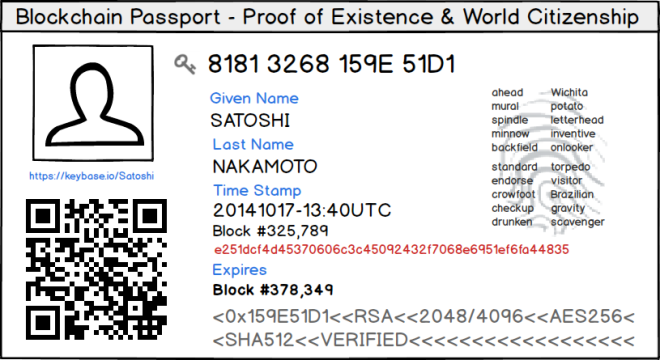Developer Creates Blockchain Passport Technology Based on Bitcoin

Christopher Ellis has created software that allows anyone to create a World Citizen Passport. The software uses PGP encryption software and the Blockchain to create an identification paper that is almost impossible mathematically to fake. Not only can the Blockchain be used to store these world passports, but it can also store all kinds of documents including loans, contracts, and receipts, as well as simplify modern banking.
The Blockchain’s potential has barely been tapped into by society as a whole. Ellis’ new World Citizen Passport software utilizes the Blockchain in ways that have never been done before.
Ellis does not believe that governments would likely take up this new technology, but people instead of nation-states would create the passports. He tells Wired :
“I wanted to create a voluntary ID system in which my proof of existence could be backed by a social network of my choosing. The real story here is why the governments didn’t invent this sooner. I came up with this over a weekend in my spare time, why didn’t they? How long has PGP been around?”
World Citizen Passport technology is completely open-source, this means that governments or other institutions would be able to use the World Citizen Passport software free of cost. Ellis’ software utilizes the technology of the Blockchain and gives individuals the ability to create an authentic, free, and secure identification document. The fundamental technology behind the Blockchain is significantly changing the world and allowing P2P transactions that never would have been possible without it. Ellis has once again proved that there is immense potential in the technology behind Bitcoin. The public ledger of transactions can be used to store any documents that could not be altered after publication. The security, reliability, and cost-effective nature of the Blockchain can pave the way for new uses and the expansion of P2P capabilities.
Private Passport Services

Ellis lays out the goal of the software on Github :
The goal of this project is to learn and layout a simple process for anyone in the world to create their own Private Passport Service that can be used to validate and prove the existence of other persons using nothing but available tools.
We will prefer open-source where available and we will draw on cryptographic tools like Public-Private Key Cryptography (PGP) and blockchain technology in the form of Bitcoin.
By doing this, we aim to give people across the world the ability to grant one another World Citizenship by virtue of their being witnessed in space and in time. This witnessing can be documented with photography and video, that content can be signed with PGP signatures, hashed and timestamped. It can then be joined with Social Network Validation services like Onename.io & Keybase.io before being plugged into more dynamic reputation systems.
First and foremost this is a learning exercise to discover whether the currently available open-source cryptographic tools are up to the task of a global social network.
While governments might not accept the World Citizen Passport anytime soon, the technology is mathematically secure and free. Ellis continues to prove that Bitcoin and the Blockchain can empower the individual at a minimal cost. Having a government passport made is fairly costly, and the World Citizen Passport is exponentially harder to forge than a government passport purchased from the underworld or darknet. Bitcoin’s fundamental technology continues to drive innovation.
Images via World Citizen Passport software and Shutterstock.